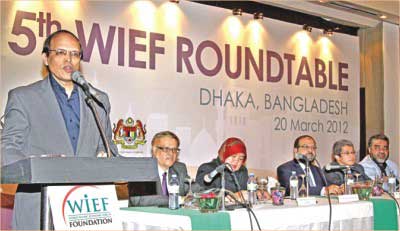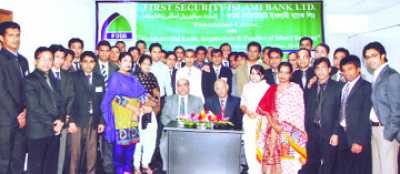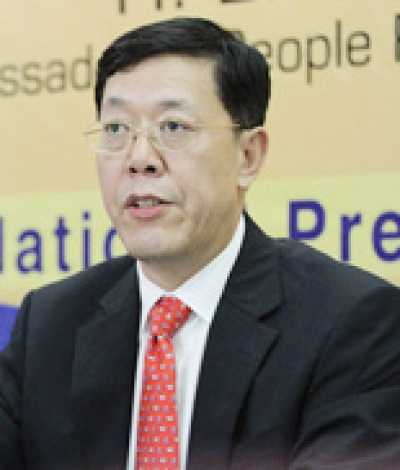Banking
Islamic microfinance: a tool to cut poverty Analysts speak at WIEF roundtable
 Atiur Rahman, governor of Bangladesh Bank, speaks at a roundtable on Islamic microfinance at Radisson Hotel in Dhaka yesterday.
Atiur Rahman, governor of Bangladesh Bank, speaks at a roundtable on Islamic microfinance at Radisson Hotel in Dhaka yesterday.
Islamic microfinance can be an effective tool to eradicate poverty if it ensures distributive justice to the downtrodden people, analysts said yesterday.
Poverty has multi-dimensional aspects: it means not only a lack of money but other issues such as poor access to clean water and sanitation, inadequate physical security, lack of voice, insecurity, powerlessness and exclusion.
They spoke at a roundtable on "Islamic Microfinance: An Instrument for Poverty Alleviation" at Radisson Hotel in Dhaka.
Malaysia-based WIEF Foundation and Bangladesh-based SEACO Foundation co-organised the programme in collaboration with the Bangladesh Federation of Women Entrepreneurs, Bangladesh Malaysia Chamber of Commerce and Industry and the High Commission of Malaysia in Dhaka.
Mohammad Abdul Mannan, managing director of Islami Bank Bangladesh, said conventional microfinance failed to benefit the poor as it runs in an exploitative manner. "So, Islamic microfinance can be a role model."
There is a philosophical difference between conventional banking and Islamic banking, he said. "Conventional banking is fully based on individual greed, while Islamic banking is based on universal brotherhood and distributive justice."
The banker said Islamic microfinance can be an effective tool to satisfy the financial needs of the poor as it focuses on a credit-plus integrated poverty alleviation scheme.
“It means we not only provide credit rather we integrate other issues such as zakat (compulsory transfer), waqf (an inalienable religious endowment), and kaffara (atonement),” he said.
Speaking as chief guest, Atiur Rahman, governor of Bangladesh Bank, said Islamic banking has been thriving in the vibrantly growing Bangladesh economy and accounts for a fifth of total banking sector assets and liabilities.
In Bangladesh, compliance of banks and financial institutions with Islamic Shariah principles is being overseen by their Shariah boards, while Bangladesh Bank oversees their soundness, solvency and capital adequacy, he said.
The governor urged the Islamic banks and the Islamic windows of conventional banks in Bangladesh to pursue vigorous promotion of Islamic micro and SME financing, in line with the country's efforts for faster poverty eradication with deeper, wider financial inclusion.
As a panel discussant, Dadang Muljawan, senior economic researcher of Islami Development Bank in Saudi Arabia, said Islamic financing would grow further as it is gaining popularity in Muslim and non-Muslim countries.
He said Shariah-based banks emphasise the development of the poor as it not only provides funds, but also transforms people's life.
Datuk Hajah Zabidah Ismail, managing director of Amanah Ikhtiar Malaysia, said Shariah-based microfinance can be an alternative tool to eradicate poverty as it promotes a balance of equitable growth.
Abul Hasan M Sadek, vice chancellor of Asian University in Bangladesh, said microfinance is only a part of Islamic banking. It can be an effective model to eliminate poverty as the conventional system charges higher interest.
The Daily Star/Bangladesh/ 21th March 2012
Deputy Managing Director of FSIBL posing for photograph with the participants
 Syed Waseque Md Ali, Deputy Managing Director of First Security Islami Bank Limited, posing for photograph with the participants at the closing ceremony of 11th foundation training course organised for the Bank's officers in the city recently.
Syed Waseque Md Ali, Deputy Managing Director of First Security Islami Bank Limited, posing for photograph with the participants at the closing ceremony of 11th foundation training course organised for the Bank's officers in the city recently.
Financial Express/Bangladesh/ 20th March 2012
BB to disburse Tk 4.15b two-step loan fund under JICA assisted FSPDSME
Sonia H Moni
The central bank is going to disburse a two- step loan fund for refinance or pre-finance under JICA assisted Financial Sector Project for the Development of Small and Medium Enterprises (FSPDSME), officials said.
"Japan International Cooperation Agency (JICA) will provide the fund worth Tk 4.15 billion for the development of SME sector including a technical assistance component," FSPDSME project director Sukamal Sinha Choudhury told the FE.
He said: "This fund will help boost the country's small and medium enterprises sector."
He said "Under the two- step loan fund, participating financial institutions will be provided with refinance or pre-finance for lending to SME sub-projects of productive investment for medium to long term duration."
Mr Choudhury, also General Manager of SME and Special Programme Department of the Bangladesh Bank (BB) said: "We invited applications from 47 banks and 31 non-banking financial institutions (NBFIs) for loan disbursement by March 27, 2012."
According to BB rules for eligibility for availing the fund, the banks and NBFIs have to comply with some of its conditions -- the institutions have to comply with anti-money laundering instructions, have to make profit for at least three consecutive years, classified loans of the institutions should be under 10 per cent.
Mr Choudhury said: "BB will disburse loans with five per cent interest to the banks and NBFIs and these financial institutions will provide loan to the entrepreneurs as per the interest rate rules of the central bank."
An operating guideline comprising policies and procedures of this fund has been developed for the banks and NBFIs. The central bank has requested the banks and NBFIs to review the operating guidelines. The fund will be governed by this operating guideline.
BB GM said: "We will scrutinise all the applications within a short time and if they fulfil the conditions they might get loan from next month."
Financial Express/Bangladesh/ 20th March 2012
BD should resolve dispute with WB: Chinese envoy Underlines importance of having a deep seaport
 Li Jun
Li Jun
The newly-appointed Chinese Ambassador in Bangladesh said Monday his country will consider participating in the Padma Bridge project only when they get a formal proposal from the government.
"We will consider the matter, if Bangladesh puts forward a formal proposal to construct the Padma Bridge," Li Jun told the journalists while responding to a question at a 'meet the press' programme at the National Press Club (NPC).
Mr Li, however, said Bangladesh and the WB should first resolve their problems involving the issue.
"It is very important for Bangladesh to cooperate with the WB. The WB has made great contribution towards the country's development. I hope Bangladesh will be able to resolve their dispute with the WB."
NPC President Kamaluddin Sabuj, General Secretary Syed Abdal Ahmed, and former presidents Shawkat Mahmud and Khondker Monirul Alam, among others, spoke on the occasion.
The NPC-organised event was moderated by a senior diplomatic correspondent Zahirul Alam.
The comments of the Chinese envoy came following a stalemate over disbursement of pledged fund by the World Bank (WB) for the US$2.9 billion Padma Bridge project.
The WB's delay in loan disbursement also prompted Bangladesh to seek Malaysian assistance in constructing the bridge under public-private partnership (PPP).
On mutual trade and investment between Bangladesh and China, he said trade relation between the two countries has been gradually increasing.
"The volume of bilateral trade in the fiscal 2010-11 was US$8.2 billion. Bangladesh's export volume to China has also increased significantly."
He said the Chinese government will do its best to enhance the economic cooperation between the two countries, and continue to encourage Chinese entrepreneurs to invest in Bangladesh.
Mr Li suggested the Bangladesh government to ensure uninterrupted supply of gas and electricity for improving the country's investment scenario.
"Bangladesh has a fairly good investment environment and abundance of workforce. Labour cost in this country is fairly low. If the government can further improve the investment environment, particularly by ensuring proper supply of power and gas, this country will become an ideal place for Chinese investment and industrial relocation."
The Chinese envoy said construction of the proposed deep seaport could help Bangladesh become an important economic hub in the region. The Chinese entrepreneurs are interested to participate in the seaport construction project.
On regional connectivity between Bangladesh and China through Myanmar, he said the connectivity could ensure economic growth and thus make the people of the region benefited.
"Our relationship is very good. China considers Bangladesh a very important country in South Asia. Development of the country is important for China."
Asked whether any improvement in Indo-China relationship would affect the Bangladesh-China ties, he said, "It will not do any harm to Bangladesh-China relationship. My priority is to encourage further cooperation and development of our bilateral relationship."
"I'm confident that with our joint efforts, the closer and comprehensive partnership of cooperation between China and Bangladesh will be further consolidated and developed. China-Bangladesh relationship will be brought to a new height and bring tangible benefits to the people of the two countries."
Responding to a query whether China would build dam on the river Brahmaputra, the envoy said his country is exchanging information with the neighbouring countries on ways to prevent recurrent floods.
China is also cooperating with other countries to deal with the adverse impact of climate change, Mr Li added.
Financial Express/Bangladesh/ 20th March 2012
BB likely to approve 8 new banks on Mar 27
A total of eight new commercial banks, including three non-resident Bangladeshi (NRB) banks, may get approval at the next board of directors' meeting of Bangladesh Bank, sources said.
The meeting is likely to be held on March 27 for taking the final decision on allowing new private commercial banks (PCBs).
Sources close to the decision-making level, however, did not mention the names of all the new scheduled banks, but they hinted that the whole thing would be based on the desire of the "high-ups in the government".
Names of the three proposed NRB banks -- NRB Commercial Bank Limited, NRB Bank Limited and NRB Bank Limited -- were placed before the board on March 15 for approval, but no final decision was taken at that meeting.
"The country will receive around US$ 150 million as paid-up capital, in aggregate, from the NRB banks if the board gives them its approval," a source said, speaking in favour of allowing the three NRB banks.
The foreign currency thus obtained will help improve the country's foreign exchange reserve position, he said, adding that the NRB banks would also help in attracting foreign direct investment (FDI), particularly from the NRBs across the world.
"We're now working on holding another board meeting by the end of this month," an executive director of Bangladesh Bank (BB) told the FE, adding that the board would take the final decision on approval of the new banks, both PCBs and those involving NRBs.
The BB executive director did not specify the number of banks to be approved at the board meeting.
Meanwhile, the preliminary scrutiny of all 16 applications selected for establishing the new PCBs was almost completed Monday, another central bank official said.
A four-member technical evaluation committee, headed by general manager of the Foreign Exchange Policy Department of Bangladesh Bank -- Ahmed Jamal, was earlier formed to examine the primarily selected applications from persons seeking to set up new PCBs.
"The technical evaluation committee will submit a report with scores of all applications to the application evaluation committee within a couple of days for giving it a final shape," the central bank official said.
Another four-member separate application evaluation committee, headed by Senior Deputy Governor of BB Abul Quasem, has already been formed to finalise the evaluation report on the applications.
"The report relating to the setting up of new commercial banks will be placed before the next board meeting for final approval," the BB official said without elaborating.
Earlier, 37 applications were submitted with the central bank for setting up new PCBs. Of them, 21 were rejected by a preliminary committee due mainly to the lack of necessary papers and documents.
Currently, a total of 47 commercial banks are in operation in Bangladesh.
Financial Express/Bangladesh/ 20th March 2012



